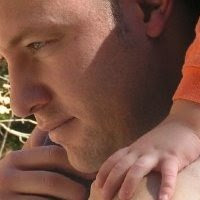
If this blog had readers, which it doesn't, some of them would not know that I served a two-year mission for the LDS church in New York City. Others would forget and almost all of these theoretical readers could never understand what that means to me exactly.
I saw a lot of things there. I served about 8 months in middle-class areas on Long Island and a fair amount of time in lower-middle or economically depressed areas. I spent time in the Prospect Park neighborhood in Brooklyn, living on the Eastern Parkway about halfway between the park the "Bed-Sty" neighborhood named for streets.
I also spent time in the Bronx near the Kingsbridge Road exit on the D train near the Grand Concourse. Neither were horrible neighborhoods but I was by far in the ethnic minority and there was a good deal of poverty to go around. I knocked on doors a lot; almost every day for a few solid hours, then for weeks and then months trying to find people who wanted to hear what I had to teach.
I met a lot of interesting people that loved and hated me and what I represented. I enjoyed playground basketball and saw dead people and knew where to get cheap pizza and generally had a good time. But in the process of knocking doors I got in a quite a few doors and saw into the lives of the people who lived around there. I saw ugly, horrible glimpses into suffering and hardship and despair. I tried to help people and I think sometimes I did help.
It would be fair to say I loved the Bronx and by the time I was doing my last six months in New York I was there and I was good at what I was doing. I knew how to talk to people and I knew the culture and the lingo and people. I recall leaving New York and flying over the Bronx and feeling a homesickness far greater than anything I felt for Utah while I was gone.
Back here among very middle-class, much more advantaged people, I often encounter those who have a lot of assumptions about people who live in the "ghetto". The most realistic people realize nobody can help where they are born and improving your life from difficult circumstances is a steep climb. Still, almost universally, there is a sometimes spoken but more often an implied attitude that most people who live in bad places are at fault for not pulling themselves out of the hole the live in. Anecdotally, everybody knows of a story where a remarkable individual manages to achieve and leave economically depressed areas and get a better life. It happens and Hollywood makes movies about it.
I have often felt powerless to explain to people that for many, especially people born closer to average than to exceptional (like me), this is realistically almost impossible. The environment crushes people before they ever find their own footing. I never feel like I properly convey this to people. It requires a first-hand experience to live among the despair and feel the hopelessness fill your lungs and permeate your being.
So, along comes the Sundance Film Festival feature "Push: Based On A Novel By Sapphire." I saw the film as the showing of the award winner for the festival (audience and Jury awards as it turns out) and it might be the only way I would have viewed it. After all, our main character Precious Jones is overweight and has two pregnancies from her father. Incest, rape, ghetto, and despair aren't especially attractive film fodder. Precious' mother and home life are far worse than her father even.
So its a bit more than a bit grim but when I sat down to watch the film, it hit home - hard. Director Lee Daniels, a child of Harlem, captured the inner city life that I have such a difficult time explaining to those who have never been there or seen the inner-workings of the slums. Not using drugs, not accepting a lifetime of welfare, not getting pregnant for prestidge, profit or because you want to feel lovved and choosing to try to improve are major victories. Somehow in white middle America we expect the disadvantaged to have college graduates instead of GEDs and major achievements instead of mere survival.
Those things are possible but not until those mired in despair have their vision raised. Education and self-worth are the keys of course. Easy to type.
So, this film is cinema and art and truth. It is ugly and beautiful and powerful and poetic and tragic and hopeful. If some studio wants a "Best Picture" nomination for 2010's Academy Awards ceremony, they will buy it up and promote it. It remains unsold as of now which I take to be a bad sign. This is a film that deserves to be seen. This is a film that must be seen.
Oh and Mariah Carey is in it and is solid but Mo'Nique is transcendent in creating one of the most vile characters in memory.



